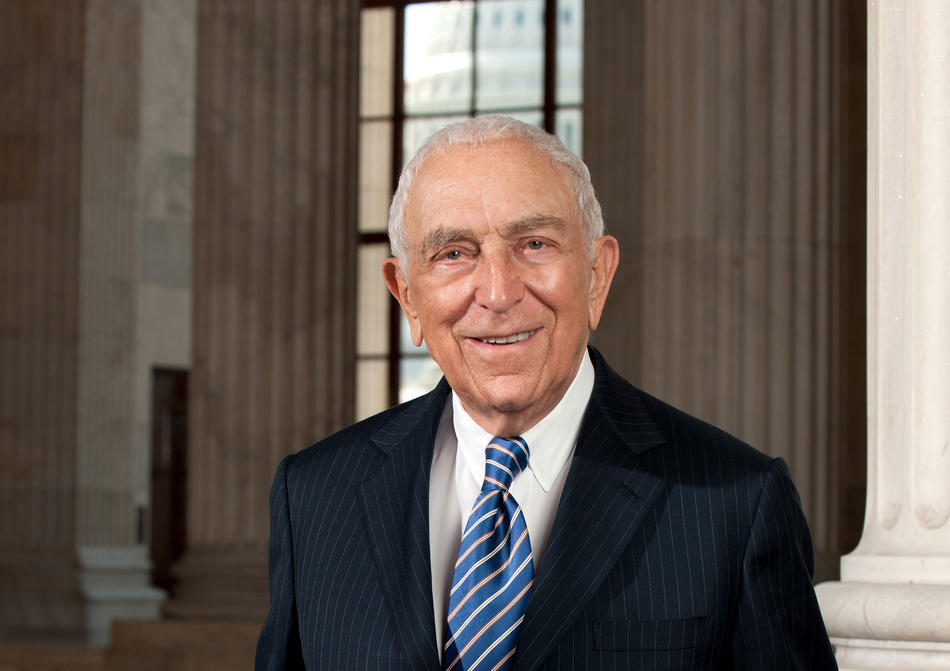It was a Saturday in 1936, and the boy, who was twelve, wanted to play baseball. But his father, Sam, a poor weaver at a silk mill in Paterson, New Jersey, had other ideas. He took the boy to the factory.
They went inside. The mill was big and hot and filled with machines and workers and the loud rhythms of the cast-iron looms.
“Do you feel the building shaking?” said Sam.
“Yes, Daddy.”
“It’s dark in here, isn’t it?”
“Yes, Daddy.”
“It’s dirty in here,” said Sam. He took his son’s hand and touched it to the silk that rolled off the spools. It left a glaze of machine oil and dirt on the boy’s skin.
“You see that?” Sam said. “That’s dangerous to your health.”
The boy’s childhood was filled with these sort of Dickens-on-the-Passaic vignettes, which affected him for the rest of his life. He grew up to become CEO of the payroll management company Automatic Data Processing (ADP), where he made enough money to run for the US Senate. He won the seat and was reelected four times. There, he built a legislative record rooted in his life experience: poverty, his father’s death at age forty-three from cancer, his mother’s struggle to pay the doctors and support two children, and an opportunity given to him as a veteran.
Frank Lautenberg ’49BUS, who died on June 3, got his first job while in high school, at his parents’ short-lived candy store. The family bounced around so often during the Depression that Lautenberg attended thirteen New Jersey public schools. He served in World War II — the last member of the Senate to have done so — and, after returning from Europe, went to Columbia on the GI Bill.
He was fifty-eight when he entered the Senate in 1982. As a lawmaker, Lautenberg authored the Toxic Right-to-Know Act of 1986, which required industry to disclose hazardous-chemical information to the public; the 1989 legislation that banned smoking on domestic flights; and the law barring those convicted of domestic abuse from purchasing or owning guns. His first major piece of legislation to be passed, in 1984, withheld federal highway funds from states that didn’t raise their legal drinking age to twenty-one, leading to a national standard.
But Lautenberg, whose father quit school in the sixth grade, always came back to the importance of education. In 2008, Lautenberg co-sponsored the Post–9/11 GI Bill, to help veterans returning from Iraq and Afghanistan meet the rising costs of college.
In a 2005 interview with the Rutgers Oral History Archives, Lautenberg credited the original GI Bill for the transformation of “this kid who had no chance of a future.”
“Columbia,” he said, “was a life-changing experience. It wasn’t so much the subjects that I learned; it was the horizons that I saw. When you’re in the back of the store you don’t see life that way.”
Graduation was especially moving for a young man who had left his family to go to war as a signal corpsman and been knocked from a telephone pole in Antwerp in 1944 by the force of a German V-1 bomb.
“When I stood on the steps of Low Library,” he said, “and General Eisenhower was the president of Columbia, and I got my diploma from General Eisenhower, seated in the audience were three of the most important people in my life: my grandmother, my mother, and my sister. The three women in my life who helped shape things and give me direction.”
More than sixty years later, hundreds of veterans have been able to go to Columbia on the strength of Lautenberg’s initiative.
“If you give nutrition to a plant, it grows,” Lautenberg said. “If you give nutrition to a child, it grows. If you take a mind that can learn and you give it nutrition, it grows. I went from the back of a store to sitting at the desk that was occupied by Harry Truman before me. I still have the same desk.”



